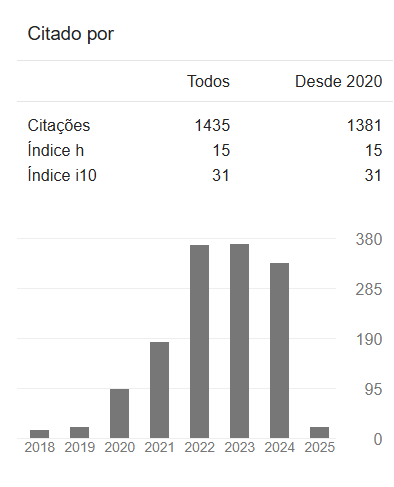THE USE OF PACKET TRACER SOFTWARE TO ENHANCE THE TEACHING OF COMPUTER NETWORKS
DOI:
10.23926/RPD.2022.v7.n3.e22069.id1571Keywords:
Information and Communication Technology, Software, Organizational Empowerment, TechnologiesAbstract
This report aims to describe the results of the exploration of practical activities, carried out in a non-formal space, with a group of six professionals in the field of Information and Communication Technology (ICT). The study is part of the first author's master's research and was developed in a beverage company, in order to explore the potential of the Packet Tracer software. The research is qualitative, with case study features. Professionals were investigated regarding their previous knowledge, received information to fill gaps on the subject and were challenged to build and simulate a Computer Network. The results indicate that the software enhanced the exploration and demonstration of theoretical concepts of Computer Networks, allowed the application of practical activities and real challenges for the training of professionals in organization, as well as showed advances and evolutions obtained with the use of the software.
Downloads
Metrics
References
CABARKAPA, Danijel. Application of Cisco Packet Tracer 6.2 in teaching of advanced computer networks. Information Technology and Development of Education – ITRO, 2015.
MARQUES DA SILVA, Antonio Eduardo. Redes de computadores: teoria e prática. Editora Senac São Paulo, 2021.
GOHN, Maria da Glória. Educação não formal: Direitos e aprendizagens dos cidadãos (ãs) em tempos do coronavírus. Humanidades & Inovação, v. 7, n. 7, p. 9-20, 2020.
GOHN, Maria da Glória. Educação não formal, participação da sociedade civil e estruturas colegiadas nas escolas. Revista Ensaio: Avaliação e Políticas Públicas em Educação, Rio de Janeiro, v.14, n.50, jan./mar. 2006, p. 27-38. DOI: https://doi.org/10.1590/S0104-40362006000100003
JACOBUCCI, Daniela Franco Carvalho. Contribuições dos espaços não formais de educação para a formação da cultura científica. Em Extensão, Uberlândia, v. 7, 2008, p. 55-56. Disponível em: http://www.seer.ufu.br/index.php/revextensao/article/view/20390. Acesso: 13 abr. 2022. DOI: https://doi.org/10.14393/REE-v7n12008-20390
LOURO, Viviane. Educação musical e deficiência: quebrando os preconceitos. Site da autora. 2013a. Disponível em: https://projeto-bandas.webnode.com/_files/200002729-344a03547d/educacao_musical_e_deficiencia_quebrando_os_preconceitos.pdf. Acesso em 13 abr. 2022, v. 12, p. 12, 2018.
MENDES, Douglas Rocha. Redes de computadores: teoria e prática. Novatec Editora, 2020.
MOULIN, Adenir Pereira de Araujo; CARVALHO, Gilda e BRIÃO, Gabriela Felix. A utilização do software Geogebra no processo de aprendizagem da matemática. Disponível em: https://www.sbemmatogrosso.com.br/eventos/index.php/enem/2019/paper/view/1587. Acesso em: 13 abr. 2022.
PUERTA, Adriana Aparecida; AMARAL, Roniberto Morato. Comparação da educação presencial com a educação à distância através de uma pesquisa aplicada. XV Seminário Nacional de Biblioteca Universitárias. São Paulo, 2008.
RABELO, Francy Sousa; LIMA, Maria Socorro Lucena. A relação teoria-prática pela pesquisa na formação inicial do pedagogo. Ensino em Perspectivas, v. 2, n. 3, p. 1-11, 2021.
TANENBAUM, Andrew. Redes de Computadores. 5ª ed. São Paulo: Pearson Prentice Hall, 2011.
TAQUETTE, Stella; BORGES, Luciana. Pesquisa qualitativa para todos. Editora Vozes, 2021.
TOLENTINO, João Tiago Coimbra e SILVA, Fernando Selleri. Tendências no ensino de matemática: o uso do software Geogebra como mediador do ensino por meio do smartphone. Disponível em: https://www.sbemmatogrosso.com.br/eventos/index.php/enem/2019/paper/view/3133. Acesso em: 13 abr. 2022.
VILELA, Rosana Brandão; RIBEIRO, Adenize; BATISTA, Nildo Alves. Nuvem de palavras como ferramenta de análise de conteúdo. Millenium-Journal of Education, Technologies, and Health, n. 11, p. 29-36, 2020.
YIN, Robert. Estudo de caso: planejamento e métodos. Porto Alegre, RS: Bookman, 2005.
Downloads
Published
How to Cite
Issue
Section
License
Copyright (c) 2023 A Revista Prática Docente tem o direito de primeira publicação

This work is licensed under a Creative Commons Attribution-NonCommercial 4.0 International License.
Authors who publish in this journal agree to the following terms:
- Authors retain the copyright and grant the journal the right of first publication, with the paper simultaneously licensed under the Licença Creative Commons Attribution allows the sharing of the work with acknowledgment of authorship and initial publication in this journal.
- Authors are authorized to take additional contracts separately, for non-exclusive distribution of the version of the work published in this journal (e.g. publish in institutional repository or as a book chapter), with acknowledgment of authorship and initial publication in this journal.











